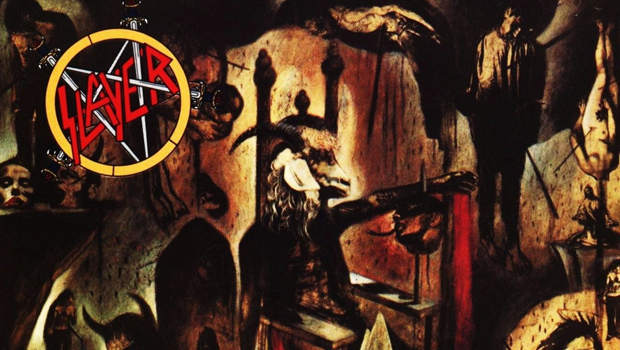Slayer: The Making of 'Reign In Blood'

Slayer guitarist Kerry King says that when the group went into the studio to make what would become its thrash masterpiece, Reign in Blood, they were “just a bunch of angry punks making a record we thought was cool.” What they didn’t realize was just how cool it would be (or how afraid it would make people of Slayer). “We were kids, like 22 years old,” says King. “We thought we made up a real good record, and that we’d outdone our last one. That’s all it was about back then.”
But Reign in Blood did far more. With its leaden rhythms, bludgeoning riffery and some of the most morbid images this side of Friday the 13th films, the album raised the bar for thrash, announcing loudly—and proudly—that Slayer had arrived as a leader of the form, on par with the more highly touted metal peers such as Metallica, Megadeth and Anthrax.
It was also a significant step forward for the Huntington Beach, California, quartet, which started, in the early Eighties, aping the New Wave of British Heavy Metal and wearing eye makeup by the time it released its debut album, Show No Mercy, in 1984—an outre fashion since even Kiss had put away the cosmetics the previous year. King gives most of the credit for the growth to producer Rick Rubin, who was impressed with Slayer’s 1985 effort, Hell Awaits, and signed the group to his Def Jam label.
“He cleaned up our sound,” King explains. “He dug what we were doing, but he told us we didn’t need all the reverb and stuff we were using back then. He brought everything more in-your-face.”
King says the band did pause before signing on with Rubin, however. Def Jam was a hip-hop label, after all—and a burgeoning one at that, with the likes of the Beastie Boys and Public Enemy still on the horizon. “There were good and bad points to it,” remembers King. “We thought, Who’s this guy to think he’s going to take one of the heaviest bands in existence, put ’em on a hip-hop label and do ’em any good?
“But we also thought, Well, we’re the only ones. We knew that if he had any desire to have a heavy band on his label, he was going to pay attention to us. So we decided to give it a try.”
Slayer and Rubin worked on Reign in Blood in Hollywood for three-weeks during which the entire 29-minute album was recorded and mixed. It also was the first time Slayer was able to record during daylight hours. “On the previous albums, we were on our own budget, so we would work from, like, 10 at night to 6 in the morning,” says King, “just because that’s when we could get the time cheapest.”
Get The Pick Newsletter
All the latest guitar news, interviews, lessons, reviews, deals and more, direct to your inbox!
Ideas for the songs on Reign in Blood came from various sources. The main riff on “Altar of Sacrifice,” for instance, had previously existed in a song called “Ice Titan,” which was never recorded. “It was a bunch of teenage gibberish,” King remembers with a laugh. “Reborn,” he says, was inspired by a movie about a witch trial he saw just before starting the album.
Of course, Reign in Blood is defined by its opening and closing epics, “Angel of Death” and “Raining Blood,” which remain Slayer fan favorites to this day. King remembers that the latter was a collaborative effort between he and guitarist Jeff Hanneman—and was finished under a bit of pressure, too, with King completing the lyrics (which came from a Hanneman dream) as his bandmates recorded their parts.
“Angel of Death,” meanwhile, was inspired by a book Hanneman read about Nazi officer Dr. Josef Mengele’s experiments on concentration camp inmates. “He pretty much made up his own story, how he perceived what he read,” says King.
It was “Angel of Death,” of course, that frightened off CBS Records, which distributed Def Jam at the time. Uncomfortable with the song’s imagery—and probably not terribly enamored with the likes of “Necrophobic” or the album’s other eight songs—the company passed on the album and let Rubin distribute it on his own Def American label. Reign in Blood was Slayer’s first charting album, hitting No. 94 on Billboard, while “Criminally Insane”—released as a belated single—hit No. 64 on the U.K. charts in June of 1987.
“We’re pretty tired of it, actually,” King says with a laugh. “I think, musically, it was ahead of its time. Nobody was ready to hear it then. If it came out now, nobody would give two shits. But back then, people were so hungry for it, it just took off.”










